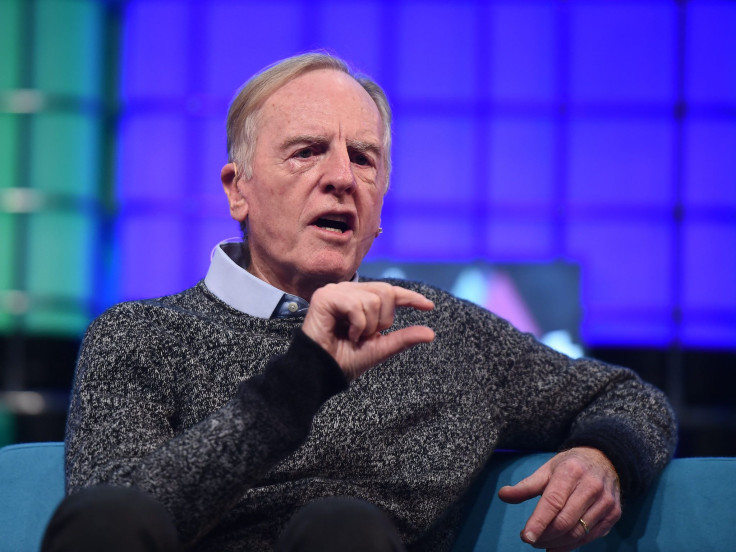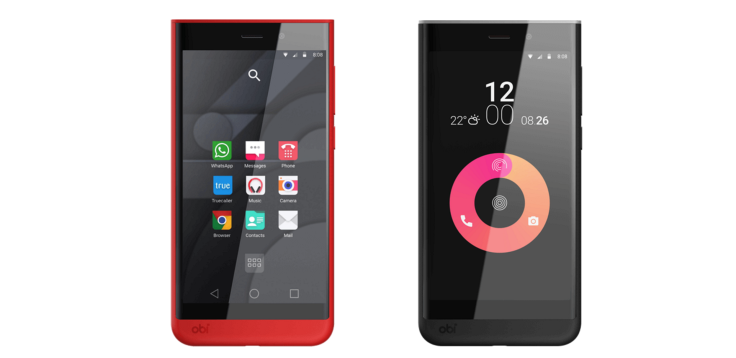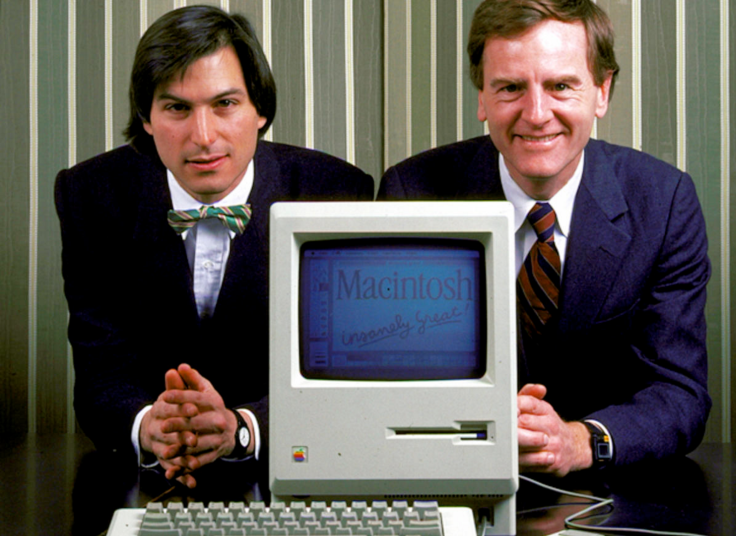John Sculley: Apple Isn't The Only Company That Can Succeed In Smartphone Market

DUBLIN -- Launching a smartphone company in a market where only Apple Inc. is really making any money and more than 1,000 firms are scrapping over ever-shrinking pieces of a big pie might appear to be a crazy idea. But for the man who led Apple for a decade, it’s a no-brainer, and John Sculley believes his Obi Worldphone can grow to become a $1 billion company by addressing the smartphone design gap and eliminating the “sea of sameness” surrounding the mobile devices.
Sculley is best known as the man who fired Steve Jobs, a “fact” Sculley says is completely untrue, despite it being repeated ad nauseam, including in the Aaron Sorkin-penned biopic “Steve Jobs,” based on the Walter Isaacson book of the same name, that is currently in movie theaters. (It was a boardroom battle, and Sculley won.)
Sculley had famously been lured away from his role at PepsiCo by the now-deceased Jobs in 1983 to provide the type of experience and knowledge that now, 30 years later, he is hoping will help him create a new global smartphone brand.
Formerly called Obi Mobile, Obi Worldphone was created by Sculley to address what he described as a “design gap" in the smartphone market, which has resulted in what he termed a “sea of sameness” among device manufacturers, especially at the budget end of the market. “Everyone wants an iPhone,” he said, “but not everyone has $800.”

The result is two new smartphones unveiled in August and going on sale in 14 countries around the world by the end of the year. The Obi Worldphone SF1, costing $200, and the Obi Worldphone SJ1.5, priced at $150, aim to bring a unique look and feel to a part of the smartphone market that Sculley believes is devoid of such options.
Enthusiasm
The phones were designed by a man Sculley previously worked with at Apple on the PowerBook laptop computer and Newton personal digital assistant. At the time, Robert Brunner was the company’s head of industrial design. He later left to form his own design firm called Ammunition, and one of his most recent collaborations has been helping to design the hugely popular Beats headphones.
Despite Sculley’s background as a top executive at huge companies such as Pepsi and Apple -- and the credentials of his designer -- entering the smartphone market at this point seems like a crazy move for anybody. But, at a time in his life when he should be taking things a little bit easier, the 76-year-old Sculley has the enthusiasm and drive of somebody more than half his age.
“I’ve been in commodity industries my entire life, and I’ve never been particularly afraid of commodity industries. You just have to understand the dynamics, and right now the smartphone industry is the single-largest consumer-electronics industry in the world,” Sculley told International Business Times during the Web Summit conference in Dublin where the former CEO of Apple was speaking this week.
Apple Is King
In that smartphone market, Apple is king. It takes more than 90 percent of the profit in the industry, while everyone else struggles to take the scraps from the table. But Sculley and Obi are not going after Apple -- and this is where he feels most of the big-name manufacturers are getting it wrong. “They are putting all of their design attention against the premium end of the market, and Apple is taking almost all the profits,” Sculley said.
At the budget end of the market, things are not much brighter for the big companies. A recent Wall Street Journal article based on figures compiled by Counterpoint Technology Market Research showed that 38 percent of the smartphones shipped by Samsung Electronics Co. Ltd. in the third quarter of 2015 cost less than $200, up from 30 percent this time last year -- and Sculley said the South Korean company is making no money on these devices. “They are not making any money on those phones,” he said. “[They have] too much corporate overhead, too much R&D, too much marketing spend, too much infrastructure.”
To prove their ability to sell handsets, Sculley and Brunner decided to test out their marketing chops last year by going to Dubai and buying undifferentiated, white-label smartphones from factories in Schenzen, China. Selling five different devices branded as Obi, Sculley said they were able to gain a consistent market share of more than 5 percent in the United Arab Emirates (UAE): “We’re equal to Huawei [Technology Co. Ltd.], and we’re just doing it with off-the-shelf phones.”
The UAE is the first country where Obi’s two new smartphones have gone on sale, but Sculley said the number of markets will expand to 14 by the end of the year, including nations in Africa and Asia, as well as the Middle East. These are areas Sculley and his team know well and why he is so confident he can succeed in such a competitive market: “We own billions of dollars of [information-technology] distribution supply chain companies all over the world, so we have a resource of talent that knows how to run very, very frugal expense structures. We know how to run distributions in Africa, the Middle East, Southeast Asia, Central Asia, Latin America.”
Billion-Dollar Company
It is this expertise and knowledge, built up over three decades of advising companies involved in industries such as wireless communications, online commerce and component manufacturing, that Sculley indicated he believes will allow Obi to build and design beautiful phones on a budget and still make a profit.
“We think we can average somewhere around 8 percent, but we will start out and sell pretty close to our bill of materials,” Sculley admitted, saying: “We are not just trying to make the money in the hardware alone.” He added that his experience in building companies that provide wireless communications -- such as MetroPCS and InPhonic -- will open up other avenues of revenue for the company.
And just how much revenue can Obi bring in? “The smartphone market is so gigantic that we think there is the potential to build a billion-dollar revenue business.”

The myth that has built up around Sculley and Jobs may be factually inaccurate, but the man who replaced Jobs at Apple is certainly happy to use his connection to the world’s biggest company and its charismatic founder to his advantage when attempting to get attention for his new smartphones.
Jobs: The Great Negotiator
While talking about the challenges of breaking into a highly commodified business like the smartphone industry, Sculley pointed out that Jobs was able to go into the music industry in the early 2000s -- an equally commodified industry -- and disrupt that by making “a few small tweaks” and having a clear vision of what he was doing. “I think you have to give Steve Jobs the credit [for keeping Apple afloat]. He sees things in bold steps, but with very simple focus. You can succeed in a commoditized industry with a few clear principles.”
Sculley contended Jobs’ greatest ability wasn’t his skill in selling a product or envisioning what came next, but in being a ruthless negotiator: “People don’t always appreciate what an amazing negotiator Steve Jobs was. People know him as the showman and the visionary, but his greatest strengths were he could recruit talent like nobody I have ever met and he could outmaneuver people in negotiations like no one I have ever met, [and] those talents are underestimated.”
So what of his former employer? Sculley said he believes Apple will “get into the automobile in some way,” adding that it doesn’t need to do it this year or next, but probably has four or five more years of big iPhone revenue to sustain it. Apple has yet to give any official indication of what it is doing in the car industry, but it is clear that it is working on something.
Of course, Jobs is no longer there, but, according to Sculley, the man now at the helm is the perfect choice to lead Apple into its next era, especially if it is about to begin manufacturing a car. “There is probably no executive in the world that is better at supply chain than [Tim] Cook, which means managing incredible complexity. If you were to say. ‘Who would you pick to do something as complex and challenging as [building a car]?’, you would have to say Tim Cook is probably the most qualified person in the world.”
© Copyright IBTimes 2024. All rights reserved.






















